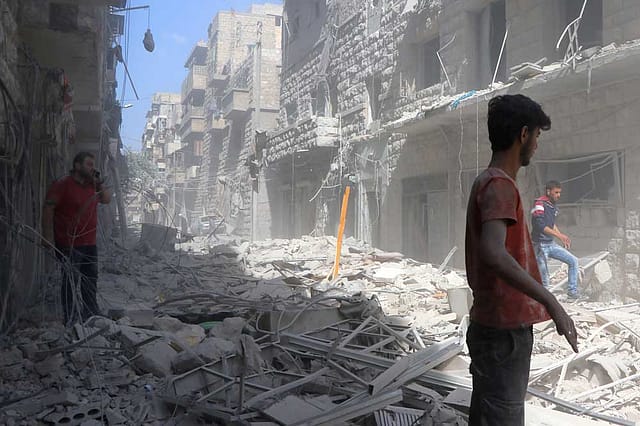The End in Aleppo

URBAN WAR IS always messy. Unlike sparsely populated areas where armed forces can quickly ‘dominate’ territory, in cities each square foot of area has to be fought for. That is always messy. People die and are injured by the thousand. But even worse pathologies often emerge: populations become ‘weapons’ when they are held hostage, to be used as bargaining chips for whatever military commanders seek—territory, supplies, respite, anything.
Fighting in Aleppo, Syria’s largest city, began five years ago in mid-2011. Originally a contest between militants who had moved into the city from the countryside and the forces of Syria’s strongman Bashar al-Assad, the war in Aleppo is no longer one of attrition. With the entry of Saudi Arabia, Turkey and Qatar on the side of rebels, and later Russia on the side of Al-Assad, the city is now hostage to larger, geopolitical goals that mar the Middle East today.
In the last six to eight months, the Russian air force has pummelled the eastern part of the city almost to rubble. Repeated requests by the UN’s special envoy Staffan de Mistura and other diplomats have tried to broker ceasefires that would allow relief materials and humanitarian aid to reach the city’s desperate population. But this was, and remains, futile: when starving a population becomes a strategy for military gain, there’s little that diplomacy can do. As of 11 October, Aleppo—a city of 1.8 million people— had 11 ambulances and 36 doctors. This is not surprising as hospitals have been deliberately targeted by Russian forces.
2026 Forecast
09 Jan 2026 - Vol 04 | Issue 53
What to read and watch this year
Aleppo is just a symptom of what ails Syria and the other multi-ethnic and multi-religious countries that dot Levantine Middle East. The Sunni Arab populations there have often felt that they are living under the tyranny of Shia rulers who are loath to share power in a democratic fashion. Nothing else can explain the barbaric conduct of their ‘rebel commanders’. Syria is a prime example. The diversity of the country—where people are divided almost by sub- district—does not allow for imagining larger political collectivities like nations. It takes strongmen to hold countries like Syria together, but when anger explodes, it leads to war, city by city, street by street and foot by foot.
Historically, only two political forms of loyalty have existed in the region: to Empire and tribe. Perhaps it is best to return to those, if only to avoid barbarity.
